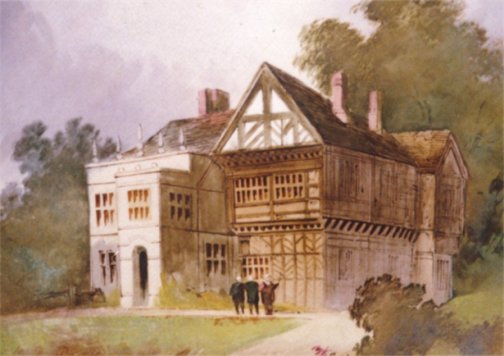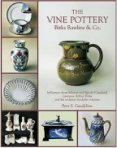Antique Porcelain Restoration, China Repair, Glass, Ceramics & Plaster
The BLUE TONGUE STUDIO
THE HALL-O'-WOOD ESTATE

LETTER XV
The Hall-O'-Wood estate, Lysons says, passed to one of the family of Kelsall by marriage. In a manuscript book, written in 1733, by a Mr. Parrot of Bignal-End, in Audley, it is stated, "Richard Kelsall, of Halmerend had two sons, William and Richard. He gave William Hall-o'-Wood estate, and Halmer-end he gave to his son Richard, who married, and had three sons - Richard, William, and John. William, the uncle gave to Richard, his nephew, the Hall-o'-Wood estate, and his son now enjoys it," (i.e. 1733). It appears from this, that Hall-o'-Wood had been in the Kelsall family from the beginning of the 17th century, and I doubt much whether Lyson's statement of its passing to it by marriage, is correct. In a pedigree of the family, taken from the Audley registers and the Parrot manuscript, I do not find that any Kelsall married a Wood: probably, the estate was purchased by Richard Kelsall, who, in 1628, married Dorothie Boothe, and, as Parrot says, gave it to his son William, who left it to his nephew Richard, as we learn from Parrott, enjoyed it in 1733. From that date to 1802 it was possessed by the Kelsalls, when the family became extinct in William Kelsall.
When I was a boy, Mrs. Kelsall, the widow of the last Kelsall, lived at the Old Hall, which, with its grounds, bore the semblance of belonging to one who had the means to keep them up. The approaches to the house were always clean and neat; gigantic oaks spread their branches far and wide; grass plots were nicely mown; the old walled gardens were in fruitful order; and fishponds, so important to the kitchen before our days of locomotive wonder, were in repair, and well-tenanted with the finny tribes. But a cruel change has come over all since her departure: the carriage-drives have lost their vestige; the fine old trees are levelled to the ground; the house and gardens are in a state of delapidation, exhibiting the mournful consequences of intemperance and dissipation! But let me not forget to speak of Mrs. Kelsall. Forget her, perhaps, I never shall. They who endear themselves to the child, live ever after in the memory of the man.
At Hall-o'-Wood we paid an annual summer visit. Oh! the halcyon days of childhood! How we longed for the certain invitation, and counted the laggard hours till we started on our trip of happiness! and a comical start it was! About eleven o'clock of a bright summer's morning might be seen, issuing from the Rectory gates, a heavy broad-wheeled waggon, the name of Basford legibly painted thereon. Two horses - driven by Thomas Owen - of a better description than commonly used in such-like carriages, are affixed to it, and move prancingly along, and, with jumps and starts, shew that they are unaccustomed to the weight behind them. At the front of this waggon are two chairs, on one of which is seated a tall, portly gentleman; on the other, his wife. In the body of it are boards, or benches, for a goodly array of jocund children. The party consists of the Rector, his wife, and their little ones, sallying forth to Mrs. Kelsall's, and whom nothing less than a roomy waggon can now contain, for, year by year, the number is increased, and all are there but the sleeping baby in its cradle. Pleasure beams on every face: and each jolt of the waggon elicits a remark of fun and laughter, except when one from a deep-worn rut drew from the gentle sex a scream, soon hushed, or mercilessly quizzed by the boys.
We arrive at Hall-o'-Wood. 'Long John' lifts child after child from the waggon. Betty Sylvester receives us; yes! and presumes to kiss us; A chair is brought for the Rector and our mother, who descends by its means with becoming care and gravity. Into the house we go, and are welcomed by our mild and smiling hostess and her niece. I shall not describe the dinner: it was such a one as a well stocked farm, with sundry extraneous aids, can supply, and appreciated and valued more than all other feasts besides. After dinner, 'Long John' devotes himself to our service. With him we visited the gardens, and picked the fruit; the stables, and admired the horses; the farm-yard, and fed the fowls and pigeons. We went, too, with him to the head of a good sized pool, and threw in crumbs of bread, and, with shouts of joy, watched the fishes darting for their food; and, as in this world of solid earth, the large and strong oppressing the small and weak. Fare thee, fare thee well! thou scene of pleasantness! thou art gone in thy reality for ever! Yet thou lingerest like a dream about my mind, filling it with sweet visions of my childhood - fresh, innocent, and bright; and helping to dissipate the gloom which anon will hang upon the rugged, stern pursuits, the care-worn path of manhood!"
Site Visit By Andy Goodfellow 2001 - The house is still standing today and in good condition. 'Hall-o'-Wood is short for Hall of the Wood. Surrounded by ploughed fields the house is set back 500m or so from the main road. A line of tree's being still evident along the driveway.
Home | Studio | Services | Conservation | Policies | Gallery
Contact Us | Birks Rawlins | Goodfellow
Object Care |
In The Studio
Art By
Andy Goodfellow |
Links
The Blue Tongue Studio Copyright 2002-2011 Australia
This website was created by The Blue Tongue Studio
The Hall-O'-Wood Estate
 Are Your Valuables & Collections Documented For Loss Through Disaster Or Theft? Learn More By Visiting The Global Inventory Information Network Helping The World Take Inventory & Preparing Homes & Families For LossAussie Home Inventories Home Inventory Service - Australia |
 |
|
BOOK FOR SALE
|
Australian Rural Internet
Satellite Broadband
FAST 4Mbps
DVD / CD / Book
Collectors
Barcode Scanner
Estate & Finance
Software
Home Electricty
Monitors Australia


